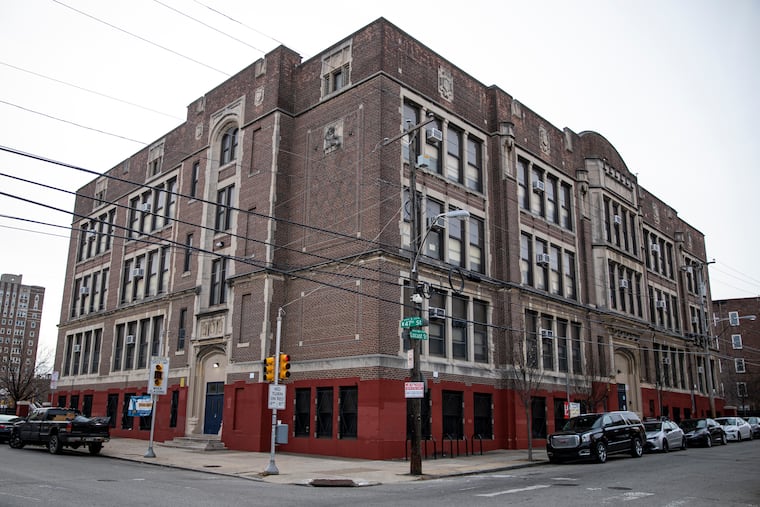Philly school board approves a $4.1M Penn partnership with Lea Elementary, votes down pool at Sayre High
The coming transformation of Lea Elementary, at 47th and Locust, was not universally hailed.

Philadelphia’s school board signed off Thursday night on a deal that would allow the University of Pennsylvania to make about $800,000 a year available to another West Philadelphia school.
The agreement, on 6 to 0 vote with two abstentions and little discussion by the board, came after some pushback from members of the community.
Penn and the Philadelphia School District, board documents say, aim to “emulate the success of the Penn Alexander school” created by the partners 20 years ago to revitalize the neighborhood surrounding the university, making it a more attractive place for faculty to live. Penn pays the district $1,300 extra per student to maintain smaller classes, hire extra staff, and provide robust programming.
Under the five-year plan, the university will invest more than $800,000 annually in money and in-kind services at Lea Elementary School. Board members Lisa Salley and Mallory Fix Lopez abstained.
» READ MORE: Penn to invest nearly $5M over 5 years in another West Philly school
But unlike the Penn Alexander model, which created an entirely new school whiter and wealthier than the district as a whole, Lea has been a fixture in the neighborhood for more than 100 years. It is composed mostly of students of color who are from economically disadvantaged families.
The coming transformation of Lea, a K-8 school at 47th and Locust Streets, was not universally hailed.
Phil Gentry, father of two Lea students, said many parents are scrambling to find out more information about the deal.
“Given the university’s egregious track record, why should we not assume that this investment, like all of its others, is designed to protect its interests and real estate values?” Gentry told the board before the vote. “Like every school in the district, we need more resources and can’t afford to turn down any support. But what sort of relationship is it where a community can’t afford to say no?”
Community meetings took place before the Penn Alexander deal happened; Gentry took issue with the fact that the board was poised to approve the Lea deal with hardly any feedback. (School officials have said they want robust community engagement; two meetings were held Wednesday and more are planned.)
“The board is being asked to approve a deal that was apparently negotiated behind the back of those of us who live in the neighborhood and send our children to our neighborhood school,” said Gentry, adding, “Letting wealthy private institutions choose which students in Philadelphia get a quality education undermines us all.”
Kristin Luebbert, a district teacher, said Penn is obligated to support all public schools, not just a select few. Some have pushed for Penn to make payments in lieu of taxes (PILOTs) to benefit the entire school system.
The university, Luebbert said, “acts like a benevolent philanthropist with one hand while robbing the children of this city with the other.”
Flooding Lea with resources will undoubtedly gentrify the neighborhood, Luebbert said.
“Make no mistake — Penn knows this and is in favor of it,” Luebbert said. “It is their objective when they make these donations.”
Penn has said it wants to preserve Lea, serving existing students and families as it has for decades. (The university currently provides support to Lea and a handful of other West Philadelphia schools, though not nearly at the financial level it is proposing for Lea.)
Abby Reisman, parent of a child who will attend Lea in the fall, voiced wholehearted support for the Penn partnership, which she said will bring “increased support for teachers, additional staffing, and educational services for students.”
Years of underfunding have put extraordinary burdens on teachers and school leaders, said Reisman, who is also a faculty member of Penn’s Graduate School of Education.
“Especially in this context, I find it difficult to understand how anyone could oppose this proposal for this school, while continuing to fight for equitable school funding more broadly,” Reisman wrote in testimony submitted to the board.
In other business, the board voted down a $10 million project that would have reopened the Sayre High School pool, which has been closed since 2017. The West Philadelphia pool had long been used to train lifeguards for city pools.
Offering safe places for the community to gather is a must, said City Councilmember Jamie Gauthier, who had pushed the board hard to sign off on the expenditure.
“It is both the moral and fiscal obligation of this body to repair the Sayre pool,” Gauthier told the board Thursday night. “This isn’t just about swimming. It’s about taking a heavily used resource away from kids and families in a neighborhood that is besieged by gun violence.”
The board said it was concerned about one-off investments without a larger strategic plan examining needs and resources citywide.
While the community deserves a pool, the district has more than $4 billion in capital needs, board president Joyce Wilkerson pointed out.
“I think it is a mistake for us to consider this without having it considered in the context of our broader capital program,” said Wilkerson.
Others raised questions about the costs of maintaining a pool. And board member Maria McColgan questioned whether pools should be the district’s priority.
“How many playgrounds could we build with this money?” McColgan said.
Superintendent William R. Hite Jr. said the pool would provide access to aquatic opportunities for thousands of children who currently lack them. The only district pool currently in operation is in the Northeast.
Board member Julia Danzy said she thought the city should share expenses around the pool.
The measure failed, 7-1. Board member Cecelia Thompson voted yes; she said she believed the pool was a worthy investment for the community.